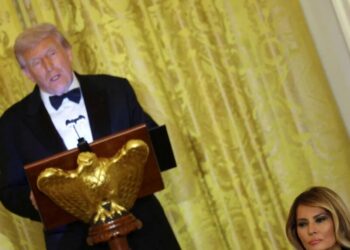Ambassador Mike Huckabee, President Trump’s envoy to Israel, met at the United States Embassy in Jerusalem in July with Jonathan J. Pollard, an American who spent 30 years in prison for spying for Israel, Mr. Pollard said.
The highly unusual meeting caught some U.S. officials by surprise, and appeared to be a sharp break with years of precedent for American diplomats.
The New York Times learned of the meeting from three U.S. officials who spoke on the condition of anonymity to discuss sensitive information. When The Times asked Mr. Pollard about the meeting, he confirmed it.
Mr. Pollard said it was the first time that a U.S. official had hosted him at an American government office since his release a decade ago.
“It was a friendly meeting,” Mr. Pollard said in a phone interview on Wednesday.
The meeting with Mr. Pollard, a former naval intelligence analyst, was kept off Mr. Huckabee’s official schedule, two of the U.S. officials said. The fact that it occurred alarmed the Central Intelligence Agency’s station chief in Israel, three of the officials said.
The C.I.A. declined to comment. The White House was not aware of the meeting in advance, according to a White House official and two people briefed on the matter. The White House official also said that senior officials there were alarmed when they learned it had taken place.
It was unclear whether officials at the State Department had signed off on Mr. Huckabee’s meeting with Mr. Pollard in advance. The State Department did not respond to a request for comment.
In a statement, the U.S. Embassy said Mr. Huckabee had “meetings with numerous people, and as a matter of general policy, we do not comment as to the content of conversations.” It also claimed The Times’s reporting for this article was “filled with inaccuracies.”
Mr. Pollard, 71, was convicted of spying for Israel and sentenced to life in prison in 1987 in one of the most notorious espionage cases of the Cold War. While many Americans viewed him as a traitor, some Israelis, especially those on the right, considered him a hero and lobbied for him until he was released on parole in 2015.
Five years later, he moved to Israel, where Prime Minister Benjamin Netanyahu gave him a hero’s welcome on the tarmac at Ben Gurion Airport.
It is unclear why Mr. Huckabee and his senior adviser, David Milstein, agreed to meet Mr. Pollard. Mr. Huckabee and Mr. Milstein have made efforts to cultivate ties with the Israeli right, with whom Mr. Pollard identifies.
In his interview with The Times, Mr. Pollard said he thanked Mr. Huckabee for his efforts in support of his release. Mr. Huckabee, a Republican former presidential candidate, called for Mr. Pollard to be freed more than a decade ago.
Mr. Pollard also said there were “a lot of things that came up in conversation” with the ambassador, but he declined to elaborate.
Mr. Pollard said he did not regret spying for Israel, claiming the United States had cut Israel out of intelligence sharing. And he castigated Mr. Trump, calling him a “madman who has literally sold us down the drain, for Saudi gold.”
Mr. Trump said on Tuesday that the United States would sell F-35 fighter jets to Saudi Arabia, a move that came despite concerns raised by Israeli officials.
Mr. Pollard recently said he planned to run for the Knesset, Israel’s Parliament. In an interview with The Jerusalem Post in August, he advocated for annexing Gaza and “repopulating” the territory with Israeli settlers.
Mr. Pollard’s case was long a point of friction between the United States and Israel.
Between 1984 and 1985, Mr. Pollard gave a range of classified documents to Israel. Caspar Weinberger, the secretary of defense when Mr. Pollard was arrested in 1985, wrote that Mr. Pollard had handed over so many documents that they could fill a space 6 feet by 6 feet by 10 feet. His actions, Mr. Weinberger said, compromised U.S. intelligence sources and risked endangering American forces deployed around the world.
“The defendant has substantially harmed the United States,” he wrote.
In November 2015, Mr. Pollard was released on parole from a federal penitentiary in North Carolina, but he was not permitted to travel outside the United States. Five years later, at the end of President Trump’s first term, the Justice Department declined to extend his parole restrictions, and he moved to Israel, which had granted him citizenship while he was incarcerated.
At the time, the Justice Department’s demurral was seen as a gesture from Mr. Trump to Mr. Netanyahu.
Mr. Trump also pardoned Aviem Sella, a former Israeli Air Force officer who recruited and handled Mr. Pollard, though Mr. Sella was not extradited to the United States.
Former U.S. officials took issue with Mr. Huckabee’s decision.
“Why would the American representative in the State of Israel want to meet with Jonathan Pollard?” said Daniel Kurtzer, the U.S. ambassador to Israel from 2001 to 2005 under President George W. Bush. “It just defies any kind of logic.”
While Mr. Kurtzer acknowledged Mr. Pollard had paid a heavy price for his actions, he said there was “no reason to rehabilitate him.”
Meeting Mr. Pollard is not the first time Mr. Huckabee has lent the prestige of his office to controversial figures. In June, five Western countries imposed sanctions on Bezalel Smotrich and Itamar Ben-Gvir, far-right Israeli ministers, accusing them of inciting violence against Palestinians. Mr. Huckabee responded by hosting them in his office and denouncing the sanctions.
Mr. Pollard is the only American on record who has been sentenced to life in prison for spying for an ally. His supporters say they believe that his punishment was too harsh, but those who backed the tough sentence argued that it was warranted because he had caused serious damage to U.S. interests.
In his interview with The Jerusalem Post, Mr. Pollard declared his loyalty was to “the land of Israel and the people of Israel, without exception.”
“Just as certain members of the Trump administration profess an ‘America first’ doctrine, I wholeheartedly embrace an ‘Israel first’ doctrine,” he said. “And I went to jail for that for 30 years.”
Mark Mazzetti, Julian E. Barnes and David M. Halbfinger contributed reporting.
Natan Odenheimer is a Times reporter in Jerusalem, covering Israeli and Palestinian affairs.
The post Huckabee Held Meeting at U.S. Embassy With American Who Spied for Israel appeared first on New York Times.



